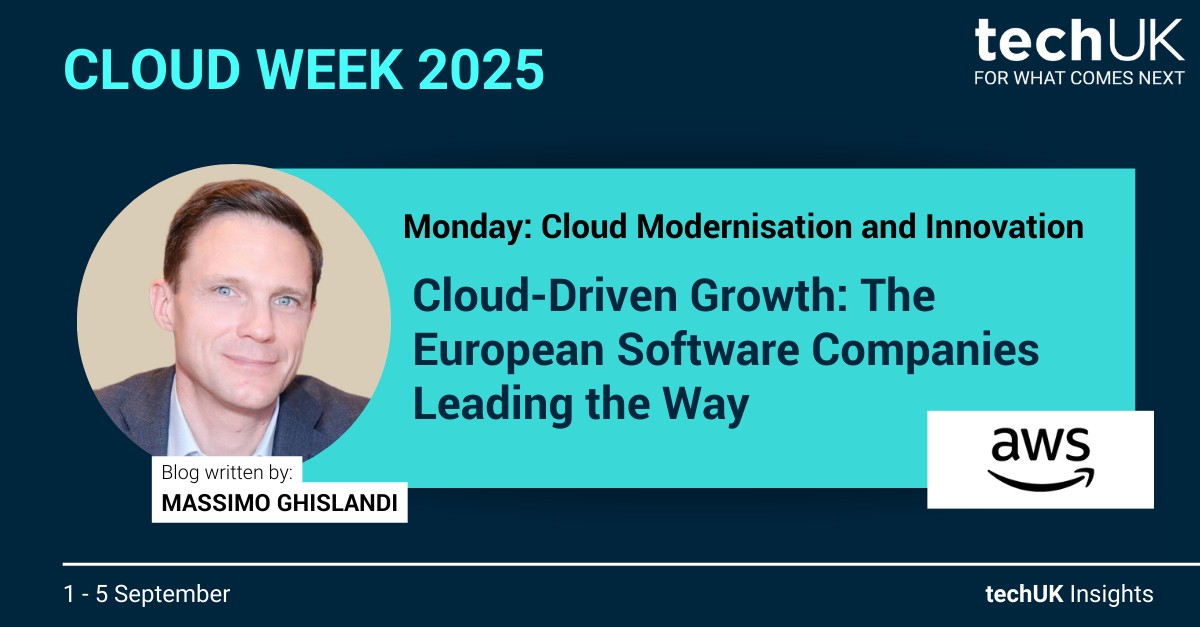Cloud-Driven Growth: The European Software Companies Leading the Way (Guest blog from AWS)

Blog written by Massimo Ghislandi, Head of EMEA Marketing for Software Companies, AWS
As European software companies continue to innovate at pace to meet rising customer expectations, the European market continues to be a trickier and more complex region to operate in. Due to a range of regulatory demands and skill shortages, remaining competitive remains a challenge. In comparison, the strength attributed to the US cloud software space is often credited to larger domestic markets, greater access to capital, and, of course, the entrepreneurial tech hub so prevalent in North America.
However, as the recent AWS Software Company Competitiveness Index has found, the European cloud industry is seemingly changing its operations, with many businesses aligned on a clear set of initiatives to transform their effectiveness over the coming months. This 2025 market research gathered the thoughts and predictions from more than 750 senior leaders, both based in Europe and the US, to understand what the current barriers to success are and how the European landscape is shifting.
To put this gap between US and European software companies into perspective, Phill Robinson (Chair and Cofounder at Boardwave) noted how ‘It takes a good software company in Silicon Valley 10 years to scale to $100 million. In Europe, it takes 15.’
This underscores the current position of the European software sector and signals an urgent need for action if the region hopes to stay competitive in the global tech race.
Key Hurdles Facing European Software Businesses
While European software companies face distinct regulatory requirements and macroeconomic conditions compared to their US counterparts, these challenges are creating opportunities for companies that can effectively navigate the region's unique landscape. In fact, 48% and 44% of respondents to the survey suggested these as key external challenges impacting the competitiveness of their businesses.
Mirko Minnich, CTO of Berlin-headquartered Beta System, summed up the issue facing the European marketplace well, highlighting how ‘America innovates, China replicates and Europe regulates’. He went on to highlight how “The EU is bombarded with regulations. I would say we spend about 20% of customer acquisition cost on fulfilling regulations and compliance within product development and delivery.” Although software companies can't control regulatory focus, 95% of decision-makers said the challenges they face are at least partly within their control.
For example, beyond the regulatory hurdles, talent and skill shortages in Europe’s software space remain widespread. This remains a key internal factor impacting competitiveness. Much of this could be attributed to a lack of mobility in Europe, in comparison to the US. As one senior leader noted, Europe is arguably more careful with hiring due to the varied regulations and employee protections put in place. Naturally, this does not help with the quick acquisition of skills and can hinder Europe's competitiveness as it is unable to upskill on a mass level at the pace needed to catch up.
One initiative that could be considered to plug these gaps in Europe, and at speed, is to embrace AI tools as a means of repurposing and developing existing talent. As a starting point, European companies could consider training their teams internally using AI tools that are already in use. By retraining them to think as AI developers, a mindset very different from that required for traditional software development, existing talent is nurtured to exist alongside the shifting landscape.
On the note of AI and its impact, the pace and scale at which the technology is developing also raises the question of whether the modern customer expects AI-advanced services. 71% of respondents to the AWS 2025 research said that they now expect AI functionality to be embedded into their software. As AI spreads across every part of business innovation, European software companies are already starting to use it in their daily operations, a figure only set to grow. 66% of firms surveyed flagged they’re now using conversational AI to improve customer experience.
Alongside the increased expectation for AI, security, and flexibility in pricing also remained key considerations of the modern customer. Learn more about this factor and its impact on growth here.
Becoming Globally Competitive: The Five Pillars
The most obvious, yet crucial, step to become competitive is to ensure innovation stands at the core of development. This is vital to bringing a differentiated offering to market at speed and ensuring you remain ahead of customer expectations. To do so, gathering customer feedback for product innovation and integrating AI capabilities into products have been noted as the two key steps businesses are taking to foster innovation. 72% of those surveyed highlighted how customer feedback is essential for software development, with a further 22% highlighting they plan on embracing this process in the coming year.
AI adoption also remains essential to increase competitiveness, advance product development, and meet rising customer expectations for intelligent, adaptive solutions. Applying virtual agents to enhance customer support has emerged as the most popular AI use case in the recent study, with 75% of respondents saying they have implemented these already. Predictive analytics, advanced threat detection, and user experience personalisation also proved popular.
Thirdly, enhancing customer experience (CX) remains key to boosting loyalty, standing out in the market, and increasing customer lifetime value. However, as this recent survey shows, the shift to the cloud is reshaping CX priorities, with a stronger focus now on security and resilience.
Finally, for European companies to advance their current offering, their go-to-market (GTM) and deployment strategy needs to be considered just as carefully. From a GTM perspective, improving this will prove vital to accelerating revenue, aligning with new buyer behaviour, and scaling effectively.
On deployment, providing a Software-as-a-Service (SaaS) offering is a proven and effective way to reduce operational costs. This also increases flexibility for customers through more usage-based pricing. Interestingly, the AWS survey found that enabling new pricing models was a key factor driving SaaS transformation for software companies. According to those surveyed, long-term business goals and customer requests have been reported as a key factor in SaaS transformation projects across the software landscape.
How Cloud Innovators Are Staying Ahead
Although the above knowledge is important for those considering their future trajectory, perhaps the most interesting finding was that cloud-first businesses are more likely to exceed expectations on customer satisfaction ratings, retention, and revenue. But why?
As Boardwave Founder and Chair Phil Robinson argues “A business in the cloud can deliver software into distribution universally, without infrastructure in other markets”. In other words, a business using the cloud can offer its software to customers anywhere, without needing to build servers or data centers in each country.
Moreover, cloud maturity remains a standout factor in business performance. Companies with higher cloud maturity are growing faster than their counterparts, with 81% of cloud adopters reporting revenue growth over the past 12 months, compared to just 67% of cloud experimenters. Similarly, investors often value software companies more when they reach higher levels of cloud maturity.
In the same vein, clout maturity enables critical innovation across the board. Companies with higher cloud maturity are more likely than cloud experimenters (those in the early stage of adopting cloud computing) to have successfully adopted new technologies to improve their competitiveness, from open-source application modernisation to microservice architectures.
If businesses want to become a cloud-first business that aims to increase AI adoption to support business evolution and competitiveness in the software space, take a look here and consider the five key steps AWS would recommend now.
For more information please contact:





